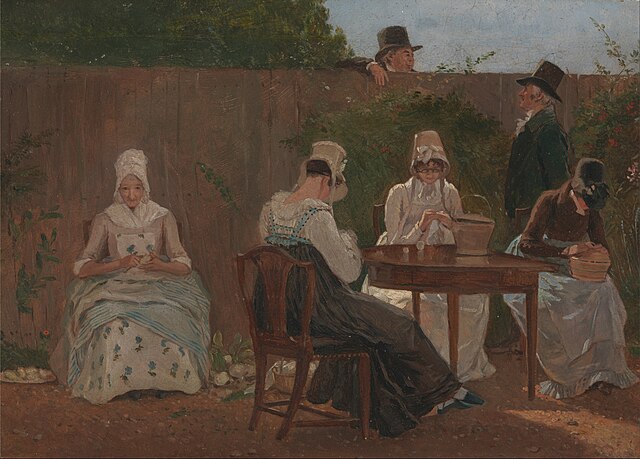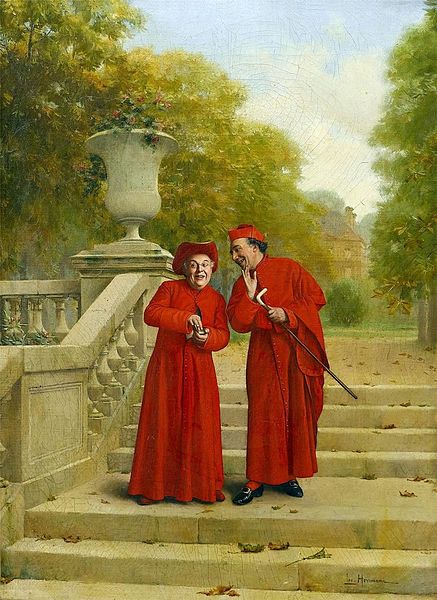
A play in the collection of the Thammasat University Library may be of interest to students of history, sociology, political science, literature, law, and associated subjects. The School for Scandal is a comedy, written by Richard Brinsley Sheridan, first performed in London in the 1770s. The TU Library also owns other books by and about Sheridan.
The School for Scandal is described by some critics as the most representative comedy of manners in English literature.
A comedy of manners makes fun of the behavior of some people in society, so it shows us a lot about the time and place that is being ridiculed. It offers details about social classes that may help us understand what it was like to live in that era.
Historians and sociologists find the comedy of manners useful because they were written as far back as ancient Greece, so they tell us about society over a range of thousands of years. More modern authors of the comedy of manners include the French playwright Molière, who joked about hypocrisy and pretension in the 1600s in plays such as The School for Wives (1662), Tartuffe (1664), and The Misanthrope (1666). The TU Library owns a number of books by and about Molière.
The School for Scandal can be funny even today when we read it or see it in performance because the characters onstage all seem to be polite, but in fact they are being quite rude.
One example in The School for Scandal is a character named Mrs. Candour who says:
I cannot bear to hear people attacked behind their backs.
But then she states to another character that a family member is suspected of being bankrupt:
I hope ’tis not true that your brother Charles is absolutely ruined?
In this way, Sheridan shows us that some people who pretend to hate gossip can be the most energetic gossips.
Another of Sheridan’s characters, Lady Sneerwell, describes why she loves gossiping. She claims it is because she was gossiped about earlier in her life:
Wounded myself in the early part of my life by the envenomed tongue of slander, I confess I have since known no pleasure equal to the reducing others to the level of my own injured reputation.
In the first scene of the play, another character says:
Tale-bearers are as bad as the tale-makers.
So people who pass along gossip may do as much damage as those who make up stories. It is not necessary to invent false rumors about people in order to do damage. Just by passing them along, bad things can happen. In the age of misleading online postings, these subjects are still current.

Gossip has been studied in academic research in the field of evolutionary psychology. Scientists who look for how gossip started and why it continues have found that it can be a way for people to help each other. The TU Library owns some books that analyze gossip.
These include Gossip and organizations by Kathryn Waddington; Gossip and subversion in nineteenth-century British fiction: echo’s economies by Jan B. Gordon; Reading celebrity gossip magazines by Andrea M. McDonnell; and Reading gossip in early eighteenth-century England by Nicola Parsons.
The TU Library also owns a number of books about slander, including legal, historical, and sociological aspects of the term.
These include Collins on defamation by Matthew Collins; Defamation by Colin Duncan and Brian Neill; Defamation: comparative law and practice by Andrew T. Kenyon; The devil in the holy water or the art of slander from Louis XIV to Napoleon by Robert Darnton; Feeding frenzy : how attack journalism has transformed American politics by Larry J. Sabato; The future of reputation : gossip, rumor, and privacy on the internet by Daniel J. Solove; Gatley on libel and slander; The law of defamation by Richard O’Sullivan and Roland Brown; The law of defamation by Laurence H. Eldredge; The law of defamation and the internet by Matthew Collins; The law of defamation in Singapore and Malaysia by Keith R. Evans; The legal limits of journalism by Herbert Lloyd; Libel law, political criticism, and defamation of public figures: the United States, Europe, and Australia by Peter N. Amponsah; The Offensive Internet: speech, privacy, and reputation edited by Saul Levmore and Martha C. Nussbaum; and Reputation, celebrity and defamation law by David Rolph, among others.
The noun gossip originated from an Old English term for close family friends. Sometime in the 1500s, the word began to mean someone who passed along rumors and stories about people. The first surviving use in writing of the word gossip as a verb is found in the works of William Shakespeare.
In his play All’s Well That Ends Well described Cupid, the god of love, as gossiping. In Shakespeare’s play The Comedy of Errors, a character announces:
With all my heart, I’ll gossip at this feast.
Both of these plays are in the collection of the TU Library.
Among the sociological reasons that people gossip are to
- reinforce – or punish the lack of – morality and accountability.
- reveal passive aggression, isolating and harming others.
- serve as a process of social grooming.
- build and maintain a sense of community with shared interests, information, and values.
- provide a peer-to-peer mechanism for spreading information.
Mary Gormandy White, an American expert in human resources, offers the following advice about how to deal with gossip in offices:
- Understand what causes or fuels the gossip
- Do not participate in workplace gossip.
- Allow for the gossip to go away on its own
- If it persists, gather facts and seek help.
Other management experts, such as Peter Vajda, take gossip seriously as a something that can affect an office.
These and other human resources and management experts do not take gossip as a subject for comedy, as Richard Brinsley Sheridan did over two centuries ago.
Here are some observations from other plays by Sheridan owned by the TU Library:
Never say more than is necessary.
- The Rivals (1775), Act two, scene one
A bumper of good liquor
Will end a contest quicker
Than justice, judge, or vicar.
- The Duenna (1775), Act one, scene three
Conscience has no more to do with gallantry than it has with politics.
- The Duenna (1775), Act two, scene four
There is not a passion so strongly rooted in the human heart as envy.
- The Critic (1779), Act one, scene one
The newspapers! Sir, they are the most villainous — licentious — abominable — infernal — Not that I ever read them — no — I make it a rule never to look into a newspaper.
- The Critic (1779), Act one, scene one
The number of those who undergo the fatigue of judging for themselves is very small indeed.
- The Critic (1779), Act one, scene two
Certainly nothing is unnatural that is not physically impossible.
- The Critic (1779), Act two, scene one

(All images courtesy of Wikimedia Commons)
